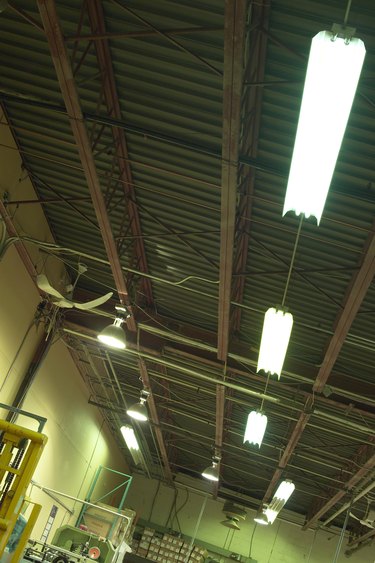Things You'll Need
Safety goggles
Gloves
Roofer’s safety harness
Sturdy ladder
Rolled insulation with vapor barrier (optional)
Roofing nails
Hammer
Metal roofing panels
Corrugated roofing screws, self-tapping with attached washers
Power screwdriver
Caulking gun with roof caulking
Ridge panel

A metal roof can easily be installed directly over open rafters. Corrugated metal panels are relatively lightweight and can be purchased to fit almost any situation. Depending on your needs and preferences, you can install the roof with or without insulation, but in many cases, rolled insulation designed for a metal roof is a good idea. The vapor barrier built into such insulation helps to minimize the amount of condensation that drips down from the roof, and the insulation itself can help to keep the interior of the building at a comfortable temperature.
Step 1
Put on your safety equipment, including gloves, safety goggles and the roofer's harness. It is important to always use such equipment to protect yourself when working on a roof. Be sure to secure the roofer's harness as specified by the manufacturer once you are on the roof.
Video of the Day
Step 2
Brace the ladder securely. If you have an assistant, have him hold it while you climb to the roof. Be sure the ladder cannot move or fall as you climb or once you are on the roof.
Step 3
Unroll the insulation with the vapor barrier side down. Use galvanized nails to attach the insulation securely to each of the rafters. Fasten it to the first rafter, then unroll it only as far as the next one before nailing it in place. It should be stretched as tight as possible, without being pulled so tightly that it gets damaged. This helps to make sure it doesn't sag down between the rafters.
Step 4
Place the first metal panel so that it aligns with the eaves, and use the self-tapping screws to attach it securely to the rafters. Put caulking along the edge of the panel and place the next panel so that it slightly overlaps the first one. The caulking will prevent leaks from developing between the panels. Screw this panel in place into a rafter, and repeat the process all the way across the building.
Step 5
Begin the next row of panels by caulking across the top of the existing panels. The new row should overlap the first row by several inches, as well as overlapping on the sides. Repeat this for the second row, and follow this procedure until the entire roof is covered with the metal panels. Repeat on the other side of the roof.
Step 6
Place the ridge panel at the top of the roof, where the two sides meet. Caulk where the ridge panel touches the corrugated panels. Screw it in place with self-tapping screws to complete the roof installation.
Tip
Fiberglass panels can be added to make skylights, but they don’t last as long as the corrugated metal roofing panels.
Warning
Working on a roof is dangerous. Always use safety equipment and proceed with caution to prevent injury and falls.
Be sure the corrugated panels are attached securely to the rafters, so that the roof is solid. If there are not enough rafters to make a solid base for the roof, you may have to add some before placing the metal panels.
Video of the Day